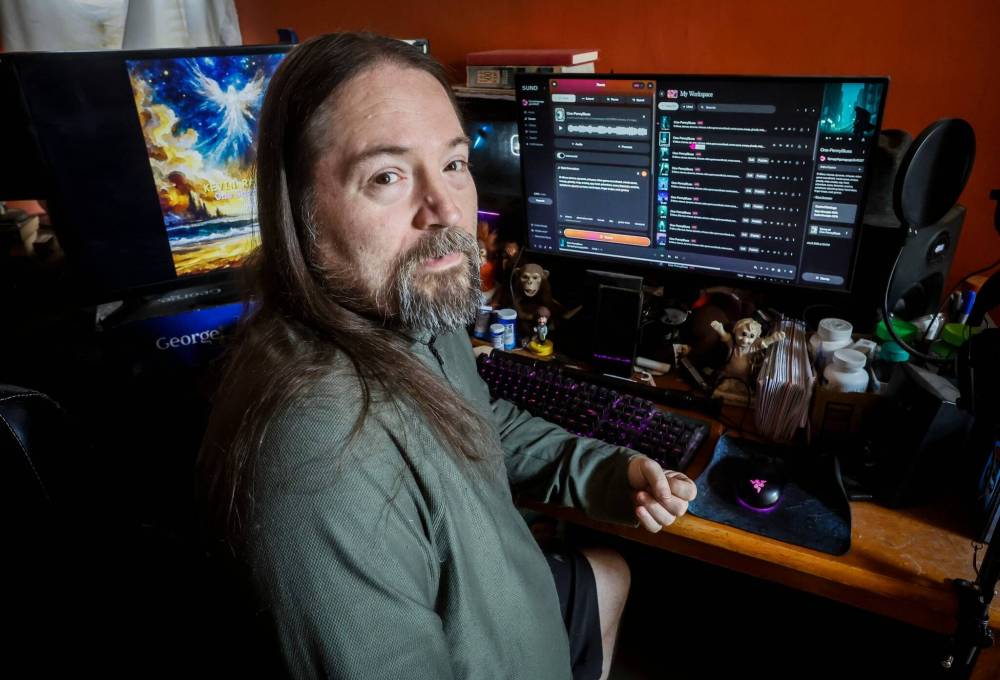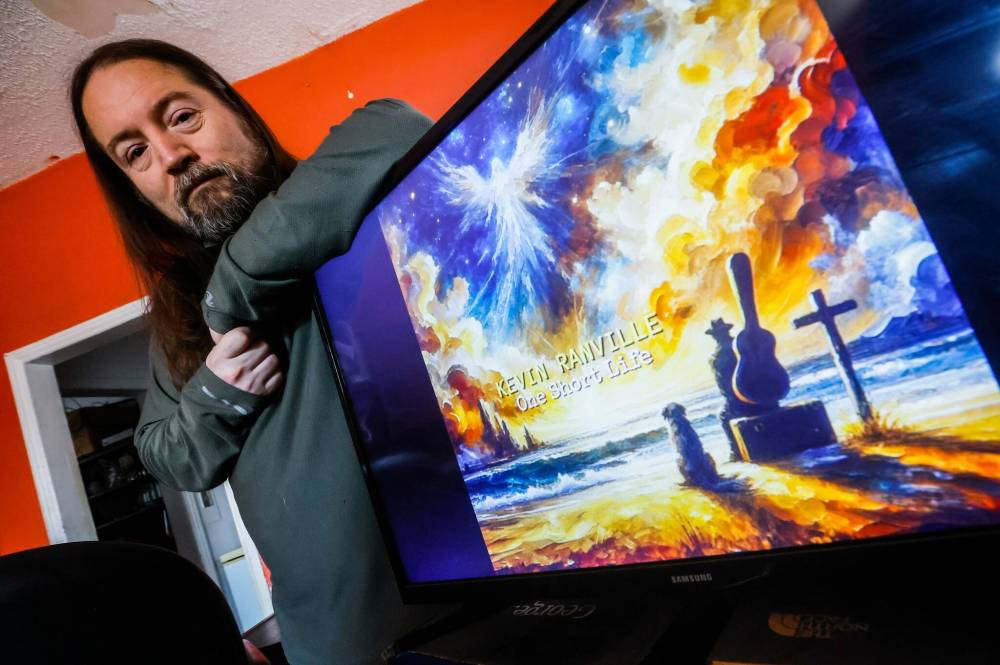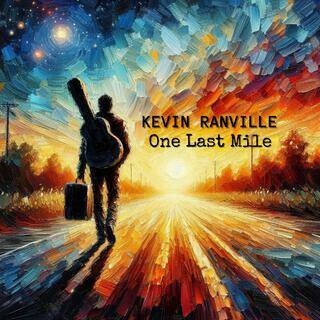In tune with AI Music-generation app helps North End songwriter overcome physical health limitations to craft new album
Read this article for free:
or
Already have an account? Log in here »
To continue reading, please subscribe:
Monthly Digital Subscription
$0 for the first 4 weeks*
- Enjoy unlimited reading on winnipegfreepress.com
- Read the E-Edition, our digital replica newspaper
- Access News Break, our award-winning app
- Play interactive puzzles
*No charge for 4 weeks then price increases to the regular rate of $19.00 plus GST every four weeks. Offer available to new and qualified returning subscribers only. Cancel any time.
Monthly Digital Subscription
$4.75/week*
- Enjoy unlimited reading on winnipegfreepress.com
- Read the E-Edition, our digital replica newspaper
- Access News Break, our award-winning app
- Play interactive puzzles
*Billed as $19 plus GST every four weeks. Cancel any time.
To continue reading, please subscribe:
Add Free Press access to your Brandon Sun subscription for only an additional
$1 for the first 4 weeks*
*Your next subscription payment will increase by $1.00 and you will be charged $16.99 plus GST for four weeks. After four weeks, your payment will increase to $23.99 plus GST every four weeks.
Read unlimited articles for free today:
or
Already have an account? Log in here »
Winnipeg musician Kevin Ranville’s latest album, titled One Short Life, was released onto streaming services in late June.
The 14 tracks include up-tempo party numbers such as Dance Before We Die, country stompers such as Fail and reflective ballads such as A Prayer for World Peace.
Here’s the intriguing part: because Ranville lost the ability to play guitar a few years ago owing to complications from diabetes, he doesn’t perform a single note on the record. Rather, he produced the entirety of One Short Life — right down to the drums, strings and vocals — with the assistance of artificial intelligence.
“In 2024 I discovered Udio.com, an AI music-generation program that lets you enter lyrics and puts them to music,” says Ranville, a divorced father of two, seated in the Polson Avenue bungalow he shares with his two dogs, Charlie and Joey.
“I began playing around with it as a distraction from depression and while I know there is a lot of controversy surrounding AI-content generation — a valid concern — I’m hoping my story proves there’s a lighter, brighter side to this technological conundrum.”
Ranville, 52, grew up in the North End, where he has lived for “99 per cent” of his life. His father, Wally, and uncle Errol are founding members of the award-winning Métis group C-Weed.
Every summer when they were youngsters, he and his brother Dave would hit the road with the troupe, travelling to sold-out shows across Western Canada, he says, dressed in a black Space Invaders T-shirt, khakis and a pair of flip-flops.
Influenced by his relatives, Ranville began playing guitar at age 13. Ahead of his 16th birthday, he enrolled in R.B. Russell Vocational High School’s music program. There he studied songwriting, audio production and engineering. He pulled straight As, and for that reason his skills were regularly sought after by his fellow students.
“Practically everybody used to get me to help them record their songs,” he says, showing off a class-produced cassette containing She Was There, the first song he ever penned.
Music may have been his first love, but by Grade 11 he realized he had an affinity for the stage, as well. So much so his drama teacher encouraged him to move to Toronto following graduation, to attend the Native Theatre School, now called the Centre for Indigenous Theatre, a respected academy that counts Graham Greene (Dances With Wolves, The Green Mile) and Jennifer Podemski (The Rez, Empire of Dirt) among its alumni.
He landed a few acting jobs when he returned to Winnipeg in 1992, though they were so few and far between that it wasn’t enough to sustain him financially.
He eventually caught on as a DJ for weddings and socials. Besides continuing to compose and play music for his own enjoyment, he also took up fiction writing. That led to him going back to school, this time to Red River College Polytechnic, where he took a two-year Creative Communications course.
In 2014 he had a book published, a fantasy novel dubbed The Shadow. He was excited about the project, except when reception for the book failed to match his expectations, he fell into a deep depression.
A lifelong North Ender, Kevin Ranville studied songwriting, audio production and sound engineering as part of R.B. Russell Vocational High School’s music program.
He didn’t work for months. Lacking an income, he was unable to pay for the medication he’d been prescribed to manage his diabetic condition, which took hold when he was at Red River.
“Long story short, I was surviving because my mom, who passed away last year, kept sending me food money,” he says, running a hand through his shoulder-length brown locks.
“But my diabetes wasn’t being controlled, so everything went to hell.”
First, he lost mobility in his extremities. Next, a retinal hemorrhage caused him to lose vision in one eye. Finally, he developed agoraphobia, an anxiety disorder he attributes to his visual impairment.
“I started noticing that whenever I went outside I’d get all panicky and worried, especially if there was somebody behind me,” he says.
“I’d hear people talking and have to turn around and face them, to make sure I wasn’t about to get jumped. It got worse over time and as a result, I rarely leave the house anymore, not even to walk the dogs, which I feel horrible about.”
“I’d hear people talking and have to turn around and face them, to make sure I wasn’t about to get jumped. It got worse over time and as a result, I rarely leave the house anymore, not even to walk the dogs, which I feel horrible about.”–Kevin Ranville
Ranville discovered the AI-powered music program Udio in the spring of 2024, by which time he was on disability. After researching how it worked, he got to work.
Step 1 was selecting a musical style. Udio offers close to two dozen choices, including rock, jazz, soul and country. Then he was prompted to enter a set of lyrics, in that case, ones for A Little Place, a pop-flavoured tune he wrote in the early 2000s. He was then asked to “set the vibe” for the song from a list ranging from “cheerful” to “moody” to “active.”
A minute later he was parked in front of his computer, grooving to the newly produced track.
“To me it sounded warm, not robotic at all, and I started going back through other songs I’d written to repeat the process,” he says.
“Not only was it fun, suddenly I didn’t feel like I was trapped behind four walls any longer. I could now explore the world through my music.”
Ranville released his debut album One More Dawn in July 2024.
Since then, he has averaged a new album every two months or so, mixing in songs he wrote as long as 30 years ago with others inspired by recent headlines.
A few weeks ago, he was in the kitchen washing dishes when he came up with the idea for a tune to address the ongoing conflicts in Ukraine and the Middle East. Four hours later he was still jotting down notes when he realized his sink remained full of water.
It’s true that he isn’t personally responsible for a track’s melody — that’s provided by Udio or Suno, another music generator he presently utilizes, based on his suggestions — but he defends the process to detractors who’ll remark, “oh, so you didn’t really write that” when they learn about a tune’s origin.
“I tell them as a matter of fact, I did, and I worked really hard at it. Not only did I put the lyrics together, I spent days refining and producing it to come up with the end product. Yes, it’s the technology producing the sound, but it’s still me making the music.”
(A 2024 article in Time magazine stated that a number of publishers, including Universal Music Group and Sony Music Entertainment, have filed copyright-infringement lawsuits against Suno and Udio, alleging the two tech companies had “lifted material” from songs spanning various genres and eras. In its defence, representatives for Udio claimed, “Generative AI models… learn from examples. Just as students listen to music and study scores, our model has listened (to) and learned from a large collection of music.” Settlement discussions are ongoing.)
Winnipeg musician/songwriter Kevin Ranville lost the ability to play guitar several years ago due to complications from diabetes, so he produced his new
album, One Short Life, using the artificial intelligence-powered music-generation program Udio.
Although there is no cost to give Suno or Udio a try, Ranville does pay a small fee, $4 per month, to access extra features, such as higher-quality sound and customized cover art for individual albums.
He laughs, saying he doesn’t have any illusions of getting rich off his pastime. Not when online counters inform him how many “listens” his songs have been garnering — somewhere in the range of 25 to 100 each, mostly from friends and family members.
“My uncle (Errol) did say he might perform one or two with C-Weed, which would pretty cool to have happen,” he says, noting he gave the female voice that sometimes “sings” on his albums the name Angel Ingram, or A.I. for short.
And while he has become a shut-in for the most part, he does have one ritual that requires him to throw on a jacket and bid adieu to the pooches for a spell every now and again.
“I have a good friend, Faye — she was one of my teachers at R.B. Russell who I adopted as my sister — who picks me up whenever I release a new album. We copy it to my phone and hook it up to the Bluetooth in her car, then go for a drive, usually in the country, with it blasting away.
“We’ve done that at night sometimes and it’s beautiful watching the sunset — the stars sometimes — listening to my music.”
To hear examples of Ranville’s work, go to boomplay.com
david.sanderson@freepress.mb.ca
Dave Sanderson was born in Regina but please, don’t hold that against him.
Our newsroom depends on a growing audience of readers to power our journalism. If you are not a paid reader, please consider becoming a subscriber.
Our newsroom depends on its audience of readers to power our journalism. Thank you for your support.


